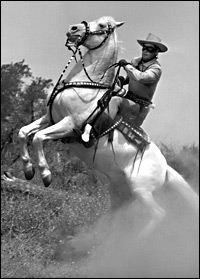After Michael Zimmer‘s talk today, “Google’s Faustian Bargain: How the Quest for the Perfect Search Engine Threatens our Spheres of Mobility,” there as a lively discussion. (Michael’s talk description below).
Larry Grossberg asked “what exactly is the link between privacy and anonymity and mobility?”
I like that question especially as Zimmer had enlisted road narratives as part of his argument and discussion. I think the answer to Larry’s question is that the American mythic story, one realizable at least to the closing of the frontier and repeated over in the classic road stories, is one of a flight toward anonymity and of course a rebuilding of self-identity. What was lost with the frontier was the place in which the performance of rebuilding took place. Luckily for America, urbanization created new spaces for the steps of rebuilding to take place. At first you achieved anonymity in New York, Chicago or San Francisco. Then the new self-identity was taken on.
If we could ignore for a moment, Cori Dauber and I won’t let you have but a moment, that Zimmer’s examples were all criminal — On the Road (car theft and assorted petty crimes), Easy Rider (interstate drug transport and dealing), Thelma and Louise (murder or at least manslaughter and flight to avoid prosecution) and pirate (Well, they are *Pirates* as Cori said)–, then we see that repeating story that is so American and while anarchic and individual, not completely unwholesome.

Driving to the Library Board of Trustees meeting after the talk, I heard a piece in celebration of the 75th anniversary of the ultimate America Count de Monte Cristo, a man who ran toward anonymity and grabbed hold of it, took a pseudo-anonymous moniker, hid his face to avoid recognition and took up his own code of ethics.
“You are only one left. They killed others.” says the Indian who saved him. “You are Lone Ranger.” Stating the obvious, Tonto gives him his pseudo-identity and 75 years of life in our imagination.
Zimmer’s abstract:
The freedom to move through both physical and intellectual space resonates within many of the fundamental values and aspirations of modernity, including free and open inquiry, personal autonomy, and liberty. These values are articulated in various spheres where freedom of mobility both physical and intellectual is typically enjoyed, ranging from the open highways, public libraries, and the Internet. New information and communication technologies are frequently designed to foster increased mobility within these spheres. Web search engines, for example, have emerged as a vital and increasingly ubiquitous tool for the successful navigation of the growing online informational sphere. As Google puts it, the goal is to organize the worlds information and make it universally accessible and useful, and to create the perfect search engine that would understand exactly what you mean and give back exactly what you want.
While intended to enhance intellectual mobility, this dissertation will reveal that the quest for the perfect search engine is actually a Faustian bargain: While designed to foster increased navigation within our spheres of mobility, the search for the perfect search engine also empowers the widespread capture of personal information flows across the Internet. Drawing from historical examples from other spheres of mobility including vehicle tracking systems, library surveillance, and DRM this talk will argue that the drive for the perfect search engine constitutes a violation of the contextual integrity of personal information flows, restricting the ability to engage in social, cultural, and intellectual activities online free from answerability and oversight, thereby limiting users full realization of the levels of autonomy, self-determination, and self-definition traditionally afforded within our spheres of mobility.


This is my favorite recent explanation of the frontier desire w/r/t social networks: Cory Doctorow’s “How Your Creepy Ex-Co-Workers Will Kill Facebook.” http://www.informationweek.com/news/showArticle.jhtml?articleID=204203573
nice post paul. i’ve seen michael z speak before and he works with a lot of interesting and engaging ideas.